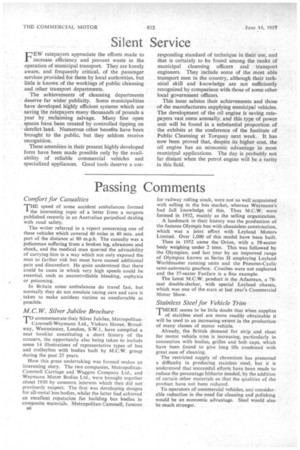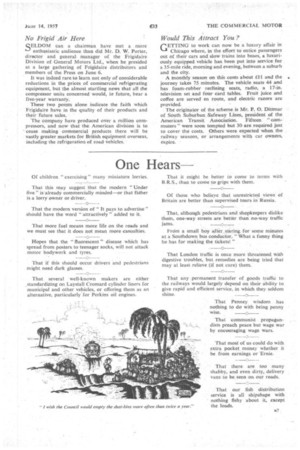Passing Comments
Page 40

Page 41

If you've noticed an error in this article please click here to report it so we can fix it.
Comfort for Casualties
'THE speed of some accident ambulances formed A the interesting topic of a letter from a surgeon published recently in an Australian periodical dealing with road safety.
The writer referred to a report concerning one of these vehicles which covered 40 miles in 40 min. and part of the distance at 80 m.p.h. The casualty was a policeman suffering from a broken leg, abrasions and shock, and the medical man queried the advisability of carrying him in a way which not only exposed the man to further risk but must have caused additional pain and discomfort. He quite understood that there could be cases in which very high speeds could be essential, such as uncontrollable bleeding, asphyxia or poisoning.
In Britain some ambulances do travel fast, but normally they do not emulate racing cars and care is taken to make accident victims as comfortable as possible.
M.C.W. Silver Jubilee Brochure
TO commemorate their Silver Jubilee, Met ropolitan
Cammell-Weymann Ltd., Vickers House, Broadway, Westminster, London, S.W.1, have compiled a neat booklet constituting a short history of the concern, the opportunity also being taken to include some 14 illustrations of representative types of bus and trolleybus with bodies built by M.C.W. group during the past 25 years.
How this great undertaking was formed makes an interesting story. The two companies, MetropolitanCammell Carriage and Waggon Company Ltd., and Weymann Motor Bodies Ltd., were brought together about 1930 by common interests which they did not previously suspect. The first was developing designs for all-metal bus bodies, whilst the latter had achieved an excellent reputation for building bus bodies in composite materials. Metropolitan -Cammell, famous
B6 for railway rolling stock, were not so well acquainted with selling in the bus market, whereas Weymann's had full knowledge of this. Thus M.C.W. were formed in 1932, mainly as the selling organization.
A landmark in their history was the production of the famous Olympic bus with ehassisless construction, which was a joint effort with Leyland Motors Limited. Over 1,000 of this model have been built.
Then in 1952 came the Orion, with a 58-seater body weighing under 2 tons. This was followed by the Olympian, and last year by an improved range of Olympics known as Series II employing Leyland Worldmaster running units and the Pneumo-Cyclic semi-automatic gearbox. Coaches were not neglected and the 37-seater Fanfare is a fine example.
The latest M.C.W. product is the Atlantean, a 78seat double-decker, with special Leyland chassis, which was one of the stars at last year's Commercial Motor Show.
Stainless Steel for Vehicle Trim
THERE seems to be little doubt that when supplies of stainless steel are more readily obtainable it will be used to an increasing extent in the production of many classes of motor vehicle.
Already, the British demand for strip and sheet for motor vehicle trim is increasing, particularly in connection with bodies, grilles and hub caps, which have been found to give long life combined with great ease of cleaning.
The restricted supply of chromium has presented a difficulty in producing stainless steel, but it is understood that successful efforts have been made to reduce the percentage hitherto needed, by the addition of certain other materials so that the qualities of the product have not been reduced.
To operators of commercial vehicles, any considerable reduction in the need for cleaning and polishing would be an economic advantage. Steel would also be much stronger.
No Frigid Air Here
qELDOM can a chairman have met a more enthusiastic audience than did Mr. D. W. Porter, director and general manager of the Frigidaire Division of Genera! Motors Ltd., when he presided at a large gathering of Frigidaire distributors and members of the Press on June 6.
It was indeed rare to learn not only of considerable reductions in the prices of commercial refrigerating equipment, but the almost startling news that all the compressor units concerned would, in future, bear a five-year warranty.
These two points alone indicate the faith which Frigidaire have in the quality of their products and their future sales.
The company have produced over a million compressors, and now that the American division is to. ' cease making commercial products there will be vastly, greater markets for British equipment overseas, including the refrigeration of roadvehicles.
Would This Attract You?
GETTING to work can now be a luxury affair in Chicago where, in the effort to entice passengers out of their cars and slow trains into buses, a luxuri. ously equipped vehicle has been put into service for a 35-mile ride, morning and evening, between a suburb and the city.
A monthly season on this costs about Ell and the journey takes 75 minutes. The vehicle seats 44 and has foam-rubber reclining seats, radio, a 17-in. television set and four card tables. Fruit juice and coffee are served en route, and electric razors are provided.
The originator of the scheme is Mr. P. O. Dittmar of South Suburban Safeway Lines, president of the American Transit Association. Fifteen " commuters " were soon tempted but 30are required just to cover the costs_ Others were expected when the railway seasons, or arrangements with car owners, expire.












































































































































